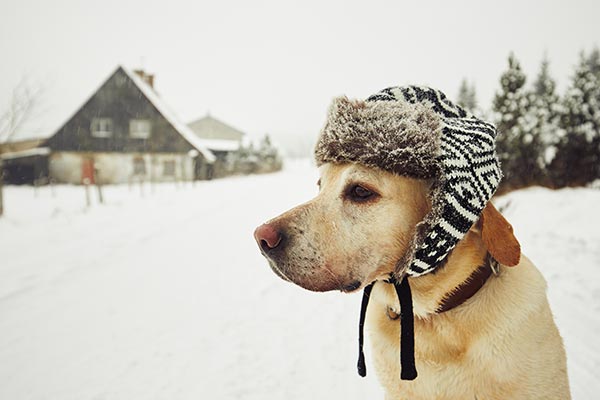Seven Ways to Keep Your Pet Safe in Winter

You protect yourself during the winter, right? You wrap up in coats, jackets, and hats, make sure you don’t spend too much time outside and drink lots of warm drinks.
The same thing should apply to your pet in the winter as well. Just like humans, pets need special care during the winter months to make sure they are at their best.
Here are some tips and tricks from the professionals at Academy Animal Hospital on how to keep your pet safe in winter.
1. Have winter gear
Our pets can get cold too during the winter months, especially if they don’t have fur or are short-haired. Just a short walk outside can leave them shivering.
Every pet should have some sort of winter gear for when they go outside. You don’t need anything fancy or jeweled up, but something that’s heavy-duty and can keep them warm during a short walk.
Many pet stores provide last-minute options and there are endless possibilities online. If you don’t know what would work best for your pet, reach out to your veterinarian.
2. Limit time outside
Although it is important to get your pet outside time if they are used to it, you’ll want to limit it, especially if it’s extra cold.
A simple cutdown of walks is a good idea. Or you can split your long walk into multiple walks throughout the day to limit exposure to the elements.
If your pet struggles with the limit of outside time, find ways to play with them indoors and burn off some of their energy. Making sure they have a window to look out of could also help.
3. Don’t leave them in the car
Just like you wouldn’t leave your pet in the car during the summer, you shouldn’t do it in the winter either. Even though you think it might be okay, hypothermia is a real threat and not something to be played with.
4. Keep antifreeze in a safe place
Did you know that anti-freeze is deadly to both cats and dogs? The chemical tastes good to them and they will continuously lick it if found on the ground. They also will lick it off their paws if they accidentally walk through it.
You should make sure anti-freeze, any other winter chemical, and snow salt are out of reach of your pet.
5. Don’t give pets holiday food scraps
When the holidays come around there are usually endless amounts of food to be found — and endless amounts of people who don’t know what pets are allowed to eat.
Make sure you tell everyone at your home that they shouldn’t be feeding your pet any human food, even food they know is okay. This limits the chance of disasters such as poisoning or severe illness.
6. Keep Outdoor Pets Comfortable
Although outdoor pets are probably used to the outside elements, that doesn’t mean you shouldn’t give them extra facilities when it does get cold.
They should have correct outwear if they need it and some sort of covered shelter to protect them from snow, wind, and ice. Hay and blankets are a great option to put into outdoor homes for them to sleep in.
7. Check their paws
Although this mostly applies to pets that go on a walk or outdoor pets, you should be checking everyone’s paws in the house. When winter comes there’s salt, dirt, and other materials all over the ground that can get into paws and infect them.
Even your indoor pets are at risk because you could track in snow salt on your shoes and it could embed in their paws. A simple regular look over should do the trick and save your pet from pain or discomfort.
Connect with Academy Animal Hospital Today
If your pet is in need of skilled veterinarian services, we’re here to help. With various veterinarian and boarding services, Academy Animal Hospital is your one-stop-shop for everything for your best friend.
